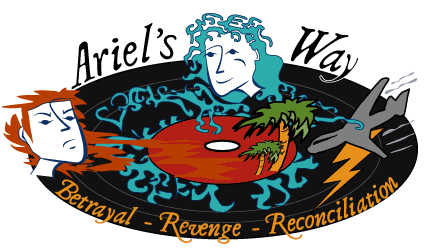 |
| Vengeful Victor (Prospero) and unimpressed Ariel |
People of the twenty-first century have just as much to learn about forgiveness as a seventeenth-century monarch did. We have better tools to work with, though.
An impressive body of research and writing is available today on the subject of “forgiveness.” Institutes at Stanford (Fred Luskin) and at Madison (Bob Enright) have made strong claims for the health benefits of forgiveness and have disseminated methods for applying forgiveness principles. Psychiatrists such as Ned (Edward M.) Hallowell in Cambridge and psychologists such as Jim Dincalci in Chapel Hill have articulated skillful, therapeutic approaches. Religious authors—Jewish (Solomon Schimmel and Charles Klein), Buddhist (Pema Chodron and Jack Kornfield) and Christian (Everett Worthington and Bil and Cher Holton)—have discussed forgiveness in practical and progressive terms.
 |
| Victor honors the love between Miranda and Freddy (Ferdinand). |
Ariel’s Way is musical theater. It is a comedy. It's aim is to entertain people of all ages. It is also a play that illustrates why forgiveness matters, and how it can work its magic in a life.
When you walk away from seeing this play, you’ll not only be humming memorable tunes and recalling great performances. You’ll also be challenged (and, hopefully, inspired) to make your life freer and more fulfilling: by flattening hooks that bind you to others in dysfunctional and unholy ways—just as Victor learns to do, with Ariel’s help, in Act Two.

No comments:
Post a Comment